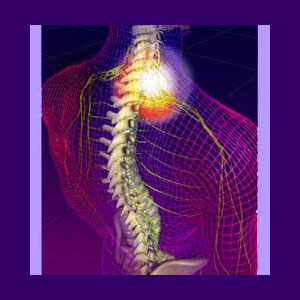
Pinched nerve pain can be an acute misery when a compressive neuropathy condition first commences. However, ongoing chronic pain is not a typical symptom associated with any truly pinched nerve anywhere in the body.
Nerves are the most sensitive tissues in our anatomies and are prone to experience a variety of painful sensations if they are disturbed or injured. Nerve pain is particularly scary, since it can affect a regional area and produce a variety of back pain symptoms, as well as weakness, tingling and numbness.
We all know that nerve damage is a serious health concern and can leave permanent disability that can affect the quality of life dramatically. This discussion examines the pain problems associated with compressive neuropathy conditions in the spine, as well as detailing why this pinched nerve pain is often illogical from a structural viewpoint.
Agonizing Pinched Nerve Pain
Acute neurological pain is often due to trauma to the affected nerve. Broken bones, serious inflammation or a foreign presence can all cause severe nerve-related pain. In these circumstances, at least the nerve pain is easily explained and treatment can begin with a direct and logical goal in mind. However, some patients with nerve related back pain suffer horrible neurological symptoms from completely different causes:
Back injuries can affect the spinal nerve components. Nerves can be crushed, severed or otherwise damaged, potentially creating lasting functional or sensory impairment.
Herniated discs can displace or compress spinal nerve roots or the actual spinal cord. Disc-related neuropathy is unlikely to be a chronic concern in most patients.
Degenerative back pain conditions, such as spinal arthritis and facet syndrome, can cause pinched nerves when the neuroforaminal spaces are decreased by the growth of osteophytes or general arthritic debris. Degeneration in the spine is universal, but nerve pain affects only a small percentage of individuals with specific conditions.
Ischemia can source chronic nerve pain even though it is a nonstructural process. In these circumstances, the nerve is impaired due to a lack of oxygen, not an actual compression scenario. You can read more about symptomatic oxygen deprivation in the section below.
Oxygen Deprivation Nerve Pain
Ischemia is a diabolical process which leaves little evidence of its existence, but can enact horrific pain and nerve symptoms very similar to structural compressive neuralgia concerns. Continual regional oxygen deprivation is rarely correctly diagnosed, since it is often part of the mindbody processes, instead of being caused by any physical issue in the anatomy.
Oxygen deprivation does not compress or pinch anything, but does deplete the nerve of life energy and reduce its overall functionality. Nerve tissue is very sensitive to even minute levels of oxygen deprivation and can suffer serious symptoms that can come and go on the whim of the subconscious mind. This condition leaves almost no physical traces or lasting anatomical damage, which explains why doctors have such a difficult time diagnosing this insidious process.
Pinched Nerve Pain Verdicts
I had been diagnosed with a variety of neurological conditions stemming from my 2 herniated discs at levels L4/L5 and L5/S1. Some of my doctors believed the discs themselves were painful, while others diagnosed nerve compression from the bulging disc material. Regardless, my pain was resistant to every treatment I attempted, and trust me, I tried almost everything.
I have since learned that millions of patients are misdiagnosed with nerve-related pain every year. These patients, like those before them, have been sentenced to decades of failed treatments, while their pain grew worse by the day. It is time to break this cycle of suffering and expose the real facts about common pinched nerve conditions.
Yes, nerve pain is common in the spine. Yes, the pain can come from a wide range of spinal abnormalities, such as disc and arthritis diagnoses. However, in these cases, treatment should bring about relief, as long as the diagnosis is sound.
So, it all sounds quite simple right? Then why do so many patients have chronic pain which defies all manner of professional care from doctors, complementary caregivers and chiropractors? Furthermore, why do so many of these patients have chronic and debilitating pain, which seems illogical from a true compressed nerve?
The answers to these questions are common sense. Many pinched nerves are not correctly identified. In most instances, a structural issue may simply be touching or moving the nerve slightly, but is not compressing it in any way. While treatment targets this coincidental nerve contact, another causative process exists elsewhere and continues to cause pain. This may be another spinal irregularity or might be a nonphysical process, such as chronic ischemia. Find this source and cure the pain.





